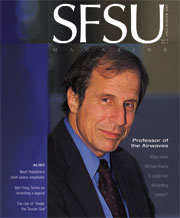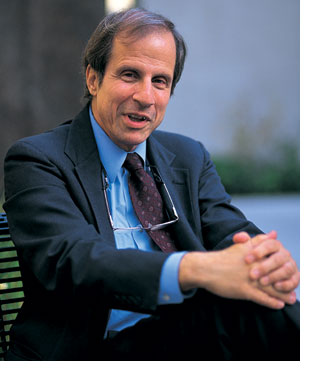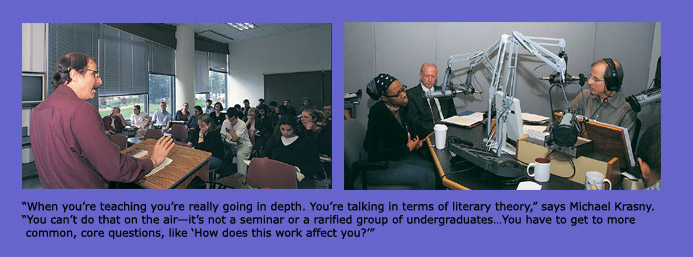 |
| |||
Reading, Writing and Radio Sixty-five thousand radio listeners in Northern California start their mornings with Michael Krasny. The host of KQED-FM’s "Forum" show, Krasny matches wits with Nobel Laureates, heads of state and Pulitzer Prize winners. And that’s just the beginning of a typical work day. When the on-air light goes off, Krasny heads to another demanding job as an English professor at San Francisco State. Professor Krasny enters the classroom quietly, almost unnoticed by the 30 or so students who are talking softly, grabbing a chance to review their assigned John Cheever story or down a late lunch. This isn't the strong-voiced, in-a-hurry-to-get-to-the-point man who commands KQED's top-rated show. The professor slouches just a bit, his hands scrunched into his pockets, reading glasses hanging from a cord around his neck. The noise level remains a steady hum as he approaches the desk, slips the glasses on and skims a few notes. If this were live radio, the class would be getting a "ten seconds" cue right about now, followed by a little up-tempo "Forum" theme music and a full-volume Krasny announcing "From KQED in San Francisco, this is âForum.'" But the only cue is a subtle removal of the reading glasses before Krasny looks up and cuts right to the point: "Let me know your impressions of Cheever. The first question I have for you is how do you sympathize?" In the flurry of questions and answers that follows, Krasny interjects with psychological theory, historical insights, and references to sociological phenomena, literary works and mythology. "Do people know or remember who Arthur Godfrey is?" ⦠"Is that what you said, is that what you meant?"â¦"By the way, who was Jupiter in mythology?" Even when faced with the tough task of reprimanding students rapt in private conversation, Krasny employs a time-honored question: "Am I going to have to separate you two? This isn't high school anymore." As the professor's lecture leaps across vast stretches of time and distance, students attempting to keep up with the literary allusions can be faced with "an appallingly long âto read' list," says Elizabeth Horabin (B.A., '01), a student pursuing her master's in English literature, "but it's worth it." Today's discussion revolves around a morally ambiguous character in Cheever's short story, "The Country Husband," but with Krasny, even the sometimes rascally protagonist gets a fair, level hearing. And the professor appears to be relishing the discussion. He paces from side to side, hunching his shoulders for emphasis, sometimes smiling wryly at passages from the text, at other times chuckling with glee. He explains Cheever's world -- sweater sets and country clubs, sublimated desires and frustrations -- to his assemblage of mostly 21st century urban youth -- bearded and pierced, midriffs bared, heads sporting about a dozen shades of hair color. "It's the suburbs!" he exclaims, throwing his hands toward the ceiling. His responses to student comments and insights could be straight out of the etiquette handbook on a Cheever housewife's bookshelf -- complimentary, just flattering enough to encourage more. "That's a very good observation. Your references to Proust are revealing. That's a nice, hopeful reading. That is an excellent point." He challenges, raises the bar, but doesn't goad, cajole or condescend. He demonstrates that he's a very good host.
On the Air Inside the dimly lit studio, Krasny launches the topic of today's "Forum" -- alternative approaches to juvenile detention. He introduces his guests, a panel of representatives from local law enforcement and community groups who meet regularly through the city's Juvenile Detention Alternatives Initiative, an effort to work toward more efficient and effective responses to juvenile crime. If juveniles aren't incarcerated, Krasny asks, "What kinds of programs are we talking about?" Lt. Cohn Johnson of the Bayview Hunter's Point Precinct mentions several city programs which help teen offenders turn their lives around. "How about the Omega Boys Club?" Krasny adds, giving the work of SFSU alumnus Joe Marshall a quick plug. Later in the show, Krasny fields calls from listeners. "Hi Michael, I hate to be critical, but too often I think programs like this⦠tend to be self-congratulatory without really addressing what the problem is." "What is the problem?" Krasny asks. "It's economics," the caller says. "You're looking at a lot of kids -- they're not stupid.⦠They sell drugs because it gets them money." Krasny lets James Bell of the W. Haywood Burns Institute respond. "We are not saying that this is a panacea for prevention in all of San Francisco's poor communities," Bell says. "We're looking at those kids who have violated the law and we are working with them to try to change their lives." Much like the classroom professor, the host is patient, encouraging and nonjudgmental. He reveals a knowing grin when a caller comes on a little too strong with the guests. "It sounds like marketing," one of these callers says, dismayed that the show hasn't included more detailed descriptions of what the community programs actually do. In what seems like just moments, the hour has passed. Krasny wraps it up. "I want to thank you all for this marketing hour," he says with a chuckle and reads a teaser about the next hour of the show: a look at the breakdown of conduct in society and concepts of civility with authors P.M. Forni and Donald McCullough. The on-air light goes off and there's a collective sigh of relief. Krasny stands and thanks the departing guests. He's relaxed and jovial. Off the air, the topic turns to the recent removal of the host's trademark mustache. "It makes you look younger," a visitor offers. "You think so?" Krasny says, his smile growing a bit wider at its newly revealed corners. There's no break for coffee, or even water, and soon the "30 seconds, sir" warning is heard, and the second hour begins. The call to teach "Forum" has covered NATO one day, followed by local election results the next and Brazil's new president a few days later. There's a good sprinkling of health stories, business and technology features, and a look at sports and entertainment. "It's like a huge magazine," Krasny says, "or like a university of the airwaves." It's inevitable to ask -- when his mornings are filled with personal heroes like Archbishop Desmond Tutu, Jimmy Carter, Cesar Chavez, and Rosa Parks -- why those afternoons in the classroom still call to Krasny. The acerbic, fast-talking radio personality fades away when Krasny talks about his SFSU students past and present, and someone more like a proud father takes over. "There's something about teaching at State," Krasny says. "You can have exceedingly bright students here who are exceptional literature students -- brilliant, remarkably gifted writers as well as critics. And you can work in the trenches -- the real trenches -- with remedial students." While Krasny is justifiably proud of the advanced students he has taught -- including poet Reginald Lockett, journalist Adair Lara, a drama student named Annette Bening, and Ed Bullins, one of theater's most accomplished playwrights -- he is equally proud of the hundreds of students who learned the basics of composition in his classes. "You get a student who suddenly begins to learn how to express himself or herself, to find language and really master something like a sentence -- the rewards are obvious," he says. On the road again On a single Tuesday in November Krasny started the day discussing cardiovascular disease and women's health with a panel of medical experts. During the second hour of "Forum" he chatted with art critic Robert Hughes. He drove to State to teach "Contemporary American Short Story" followed by "Seminar on 20th Century American Literature." Then it was off to moderate San Francisco's mayoral run-off candidates debate, sponsored by KQED and the Commonwealth Club. "In a week's time, Michael will absorb and discuss knowledgeably more ideas and facts than many of us confront in six months' time," says Raul Ramirez, executive producer at KQED. "And he manages to remain remarkably approachable, sensible and sensitive." "How does he do it?" people ask, perhaps imagining a frazzled Krasny grading term papers while a celebrity guest cools his heels in KQED's green room. Both jobs involve long hours and hard work. The busy host manages his time well and sets aside plenty for his family. "My nose is not always in a book," he insists. Krasny, 59, lives in Greenbrae with his wife, an attorney and SFSU alumna. One daughter works for a major non-profit organization that helps youth at risk. The other is a high school senior; Krasny rarely misses her soccer games and recently has joined her to tour a handful of prospective colleges. Krasny's Labrador retriever keeps him busy, too. Together they walk about four miles a day. Krasny enjoys his fast-paced life. Juggling two careers is difficult, he says, but "it's still much more satisfying and stimulating and a lot easier than doing bone-breaking labor like my father did his whole life." Krasny's father worked as an ice cream factory laborer in Cleveland. "There was no union, so nothing to keep the bosses from telling him to come in any time of day or night, especially in the summer when demand was so great." His father "wanted nothing more than I should be a professional white-collar man," Krasny recalls. "There but for the grace of my father go I -- he helped me pay for an education." Krasny, in turn, has dedicated his life to giving students -- and listeners -- an education. "I'm a public servant as a university professor and as a public radio guy," he says. And radio is the perfect medium for "bringing town and gown together and extending to the public what we do here at a university." Stay tuned for more "What you're looking for [on radio] is fodder and material that's going to be interesting to the public, that's going to be illuminating or useful. We want to stir up interest and engage people. Because ideas are always floating around at a university -- and they ought to be -- sometimes those ideas stick and program ideas will either directly or indirectly come from students, classroom discussion or colleagues." SFSU faculty members have served as Krasny's guests throughout his broadcast career, not just on "Forum," but when Krasny hosted programs at KRON, BayTV and KGO commercial radio. His many faculty guests have included, among others, Whitney Chadwick (Art), Jacob Needleman (Philosophy), Dan Macallair (Criminal Justice), Steve Dickison (Poetry Center), Eric Solomon (English), Jules Tygiel (History), and Robert Smith (Political Science). "I've been taking advantage for years of the fact that we have a superb faculty here and have raided my colleagues for guest appearances on both radio and television, showing my chauvinism toward San Francisco State," Krasny says. His academic background helps in less obvious ways, as well. "One of the things about studying literature that's been extremely useful to me in public radio is that you see the grays in everything," Krasny says. The host's ability to tackle an issue from different angles and his easy way with his guests help make "Forum" discussions so lively and interesting, says Stuart Hyde, professor emeritus in Broadcast and Electronic Communication Arts. "Unlike some show hosts -- Larry King for one -- Michael engages in a conversation, rather than a question and answer session," Hyde says. "He never holds forth, professing to have the final word on every topic." When describing Krasny, the label "perennial student" seems as fitting as that of "public educator." While still an undergrad in southern Ohio, a young Michael Krasny hitchhiked to Chicago to interview one of his heroes, novelist Saul Bellow. Instead of delivering the answers to literary life's burning questions, Bellow posed some questions of his own. "He asked âHow should a good man live? What does it mean to acquire knowledge and erudition? How does it apply to life? What do we get from the knowledge we acquire?'" Those questions -- along with many others -- have been driving Michael Krasny ever since. "I can say comfortably that I am what I wanted to be when I was a young man -- I'm a learned man now," he says. "But does that make me a better man, a better human being? It's only taught me how ignorant I am, really. It's only taught me how little I know, above all." It has taught Michael Krasny to keep asking questions. More: Krasny Statistics | ||||










